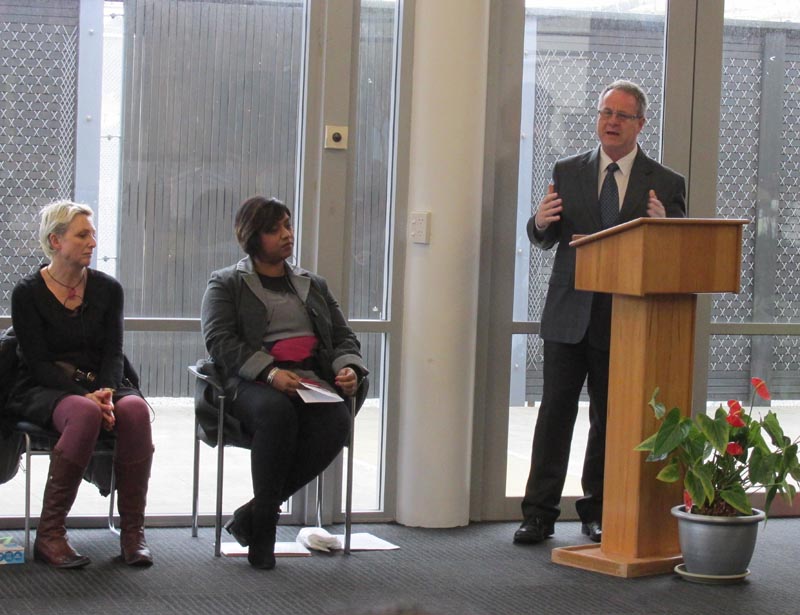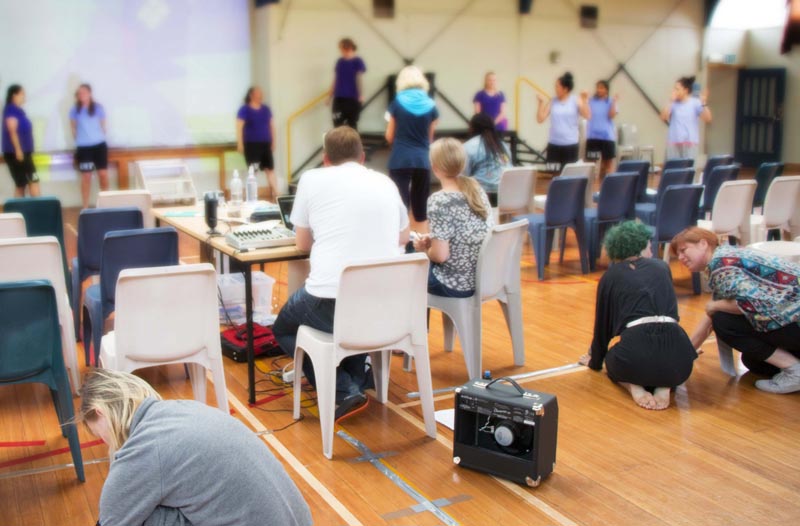Applied theatre a tool for change at Arohata Prison
27 June 2016
“Theatre engages the heart and the mind. It’s a hyperlink to change,” said Richard Benge, Executive Director, Arts Access Aotearoa, at the graduation of six women from the intensive, therapeutic programme in the Drug Treatment Unit at Arohata Prison in Wellington.
 Richard, who was the keynote speaker at last week’s graduation ceremony, congratulated the women on what they had achieved.
Richard, who was the keynote speaker at last week’s graduation ceremony, congratulated the women on what they had achieved.
“No one can undo what you have achieved today,” he said. “You have been the focus of this course: your history, your choices and your future. At times, it has been painful and lonely; a long journey of self-learning, unpicking and self-discovery.”
Each of the six women spoke about their rehabilitation journey. They spoke about how challenging the course had been; how hard they had worked; and how proud they felt. There were stories of pain and anger, of forgiveness and hope – and a lot of tissues to wipe away the tears.
Praise for support and guidance
They all praised and thanked everyone who had supported and guided them: the Drug Treatment Unit’s clinicians and the staff at Arohata Prison, the volunteers, and their family and friends.
Attending the ceremony were the 13 other women undertaking the six-month programme. Most of the women had participated in a week-long theatre workshop in February 2016, led by German theatre practitioner Uta Plate with eight local arts practitioners and facilitated by Jacqui Moyes, Arts in Corrections Advisor, Arts Access Aotearoa.
 The workshop had culminated in a performance called Come Listen to my Story of Wonderland. After the graduation ceremony, the women performed a shorter version of the original work.
The workshop had culminated in a performance called Come Listen to my Story of Wonderland. After the graduation ceremony, the women performed a shorter version of the original work.
There are nine Drug Treatment Units in prisons around New Zealand, eight of which are operated by CareNZ. Anita Grafton, Clinical Manager of the Drug Treatment Unit, said creative expression – tikanga-based arts, dance, theatre, quilting, speech-making, visual arts, creative writing, music – are vital elements for the women to explore on their journey to a new life.
Opportunity for women to tell their stories
“There are many roads to Mecca and the workshop project showed that theatre works on many different levels,” she said. “Above all, it was an opportunity for the women to tell their stories, whether it was about their addictions, their children or trauma.”
Over the week-long workshop, Anita saw a dramatic increase in the women’s self-confidence, self-esteem and self-worth.
“In traditional therapies, we use talking therapies and so the women in the Drug Treatment Unit learn to talk about themselves,” Anita says. “But theatre is more physical and we know that body work can spark past experiences on a much more fundamental level. That’s what I saw happening throughout the workshop.”
* Applied theatre, also known as applied drama, is an umbrella term for the use of theatre in an educational, community or therapeutic context. It is often done in non-theatrical spaces with participants who do not consider themselves to be artists.
RNZ reporter Maja Burry attended the graduation ceremony. You can listen to her interview on Morning Report.
LATEST POSTS
Arts News Categories
- Accessibility
- Achievements Celebrations
- Active Recreation
- Advocacy Campaigns
- Arts Accessibility
- Arts Culture
- Arts For All
- Arts In Corrections
- Auckland Region
- Business
- Comedy
- Community Arts
- Community Development
- Community Services
- Conferences Workshops Classes
- Covid 19
- Creative Spaces
- Creative Wellbeing
- Dance
- Design Arts
- Digital Culture Arts
- Event Promotion
- Events
- Festivals
- Festivals Arts
- Fundraising
- Management Governance
- Maori
- Maori Art
- Moving Image
- Music Sound
- Obituaries
- Professional Development
- Stories About People
- Theatre
- Visual Arts
- Wellington Region
- Work Jobs
- Writing Publishing


